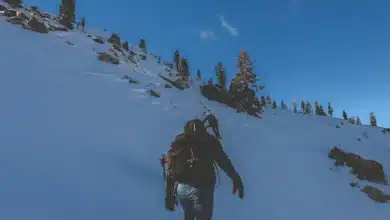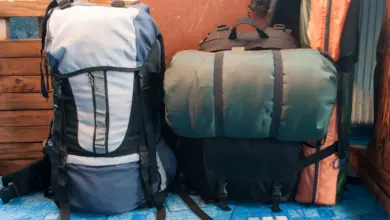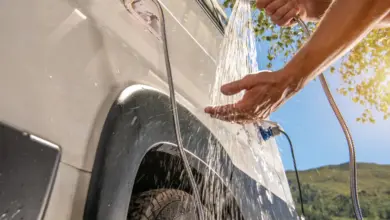How to Pick the Right Snowshoes
How to Pick the Right Snowshoes
Though many people enjoy hiking during the warmer months, there seems to be a precipitous drop-off as soon as winter arrives. One of the main reasons for that is snow; while it might be easy to throw on an extra layer in order to stay warm on the trail, the snow often necessitates specialized equipment (to prevent you from ending up knee-deep in a snowdrift).
A pair of snowshoes can easily take care of this problem, but there are so many different kinds available that it can be intimidating for first-time buyers. What size should I buy? What should they be made out of? What’s a crampon? All of these are great questions, and with a little bit of knowledge and some time to research your soon-to-be purchase, you can be on your way to enjoying a winter wonderland of a trail.
Type of Terrain
When planning a snowshoeing trip, one of the first big questions will be: where are you going? No snowshoe is great for all conditions. So first, assess what type of terrain you’ll be encountering, and then choose a snowshoe that fits that profile.
If this is your first time snowshoeing, it’s probably best to try the sport out on flat or mostly flat ground. The snowshoes made for flat ground have less aggressive traction systems and bindings that are easy to take on and off. A step up from those are snowshoes designed for trails with some ascents and descents, but not any kind of steep sections that could present a safety hazard.
These shoes have a stronger binding and more aggressive crampons to contend with the faster pace of more advanced users and increased pressure on the shoes’ moving parts as you go up and down hills. Last, are snowshoes designed for steep mountain terrain. These shoes are focused on preventing falls through even more aggressive crampons and even stronger bindings, to account for the twisting motion that can occur when stepping down steep inclines.
Perhaps an even greater consideration than the steepness of your intended terrain, though, is the type of snow you’ll be encountering. If you expect to be walking on thick, wet snow, you won’t need too much flotation – the ability to stay on top of snow. However, that wet snow can also turn very icy as the temperature drops, necessitating a more aggressive crampon that can dig into the ice before you slip. Very dry, powdery snow, on the other hand, is more compressible, and hiking in it will require a snowshoe with greater flotation.
You may also like Are Timberlands Good for Hiking?
Type of Activity
The sport of snowshoeing encompasses so many different styles that it would be impossible to create a shoe that worked for all of them. Some people choose to take slow hikes through the woods with plenty of time for photos and snacks, while others want to run snowy trails with the same vigor they would during the summer. The faster you want to go, the smaller of shoes you should buy – but know that as the shoes get smaller, you’re more likely to sink into the snow.
Sizing
As with any type of footwear, it’s important to pick the right size. This is mostly a function of your weight, but remember to take into consideration the amount of weight you’ll have in your pack too. You’ll want to buy the smallest shoes you can for your weight, as larger shoes weigh more and are more difficult to walk in. All snowshoes have a recommended load written on them, which is the weight at which they’re generally capable of providing flotation. However, if you have variable snow conditions or don’t always carry the same amount of weight, you might want some flexibility; some snowshoes, particularly the ones made by MSR, come with composite-plastic frames that can have additional length added to them. The length is added by securing a tail section when approaching deeper snow or when you have a heavier pack. Aluminum-framed snowshoes don’t have this option, so if you expect to need different levels of float, you’d need to buy multiple pairs.
Frames and Decking
Though the materials have changed over the past few centuries, the design of snowshoes has remained mostly unchanged. They still consist of a frame attached to some sort of decking material to provide flotation over loose snow, which is then attached to a binding that holds the foot in place. In the past, snowshoe frames were made from wood with rawhide webbing strung across it to provide flotation. They were less than ideal, as wood is relatively heavy and rawhide is prone to breakage over time. Modern snowshoes have frames made out of aluminum, carbon fiber, or plastic with nylon, rubber, or plastic decking.
The most important consideration when choosing a frame for your snowshoe is shape. Oval-shaped snowshoes float on top of the snow better than any other type, by distributing the wearer’s weight more evenly. However, tapered frames allow for a more natural walking stride, as they are narrower and more similar to actual foot shape. If you’ll be in soft powder or you are new to the sport, choose snowshoes with oval-shaped frames; the hiking will be easier, albeit slower due to the more awkward stride needed to accommodate the wider shoes.
The type of decking used in the snowshoe will be mostly determined by brand. MSR snowshoes have a single sheet of hard plastic for both the frame and deck, while most others have a tubular aluminum frame with a synthetic deck stretched over it. The two types don’t differ appreciably, so it will just be a matter of what brand you choose.
You may also like Tips For Safe Hiking This Winter
Binding
Most modern snowshoes have a pivot binding, which allows the tail of the shoe to tilt downward as the foot is raised up, causing snow to slide off. It’s much easier to walk if you’re not carrying snow on the decking with each step. The front of the deck also tilts up so you don’t dig your tips into the powder when walking uphill. A small subset of snowshoes come with fixed bindings, which almost completely stop the deck from tilting. These are usually designed for snowshoe runners who would be hindered by the constant flapping off their shoes during a sprint. However, for recreational snowshoeing, a pivot binding is almost always superior.
Traction
All snowshoes come with some sort of traction device to keep the deck of the shoes from sliding down the mountain like two little sleds. Crampons, the steel teeth underneath the snowshoe, are used to prevent slippage, and the aggressiveness of the crampons is tied to what kind of terrain they’ll be used in. Recreational snowshoes for novice hikers usually have fewer crampons, just on the toe, where most of the traction will come from, and some along the side to prevent lateral movement on steep surfaces. Backcountry snowshoes, which are used off trail, may also have a crampon in the rear to provide better downhill traction.
Poles
The poles used in snowshoeing differ from those used in cross-country and downhill skiing in that they are adjustable. They need to be in order to account for the slope of the mountain: shortening them when hiking uphill and lengthening them when going downhill allows you to keep your arms more level with your body. Snowshoeing poles can also be shortened to about half their length for storage when they’re not needed.
There are two main considerations when choosing poles: the type of grip and the material. The grip is a matter of personal choice; try them out in the store and see what fits best in your hands. The pole material will be mostly decided by your budget: aluminum is less expensive and heavier while carbon fiber will save a few ounces, but it costs 20% more and is also more prone to breakage.
It may not be necessary to buy new poles for snowshoeing; adjustable trekking poles that would be used for summer hikes are equally effective in the winter. However, they’ll need new baskets to account for the difference in terrain. The basket is the attachment towards the end of the pole that prevents it from sinking into the ground, whether that’s gravel, dirt, mud, or snow. The more compact the ground is, the larger the baskets need to be. While a 2-inch basket might be sufficient in somewhat wet snow, a wider one would be better for fluffy powder. Either way, it’s much cheaper to buy a new pair of baskets for your summer trekking poles than it is to get a new set of poles just for snowshoeing.
You may also like Hiking vs Walking – Differences and Benefits
Footwear
Much like with warm weather hiking, a boot that provides good ankle support is key. But an additional consideration for snowshoeing is keeping your feet warm and dry. Climbing mountains may keep the blood flowing and the extremities warm, but insulation is still necessary to prevent the toes from freezing, especially during less strenuous sections. Boots also need to be waterproof, meaning that the uppers should be either leather or a synthetic equivalent. Underneath the warm and waterproof boots, wool socks are a good idea. Wool is both insulating and moisture-wicking, which will help keep your feet dry.
If you’ve put some thought into the type of snowshoeing you want to do, it shouldn’t be too hard to narrow it down to just a few different models that have all the features you’re looking for. If you just want to be able to walk across a snowy meadow, choose some inexpensive, oval-shaped snowshoes with smaller crampons and a pivoting binding. On the other hand, if you see yourself climbing steep peaks and wanting to make a good time getting there, choose a tapered shoe with aggressive crampons and strong binding, maybe with removable tails if the snow gets powdery at the summit and you need some flotation. In both cases, don’t forget your boots and poles; you’d have a terrible time without them.



